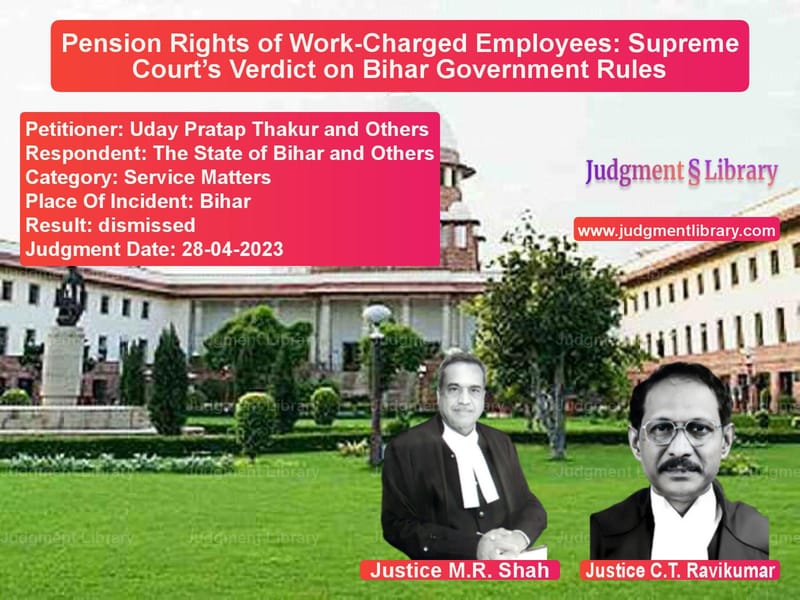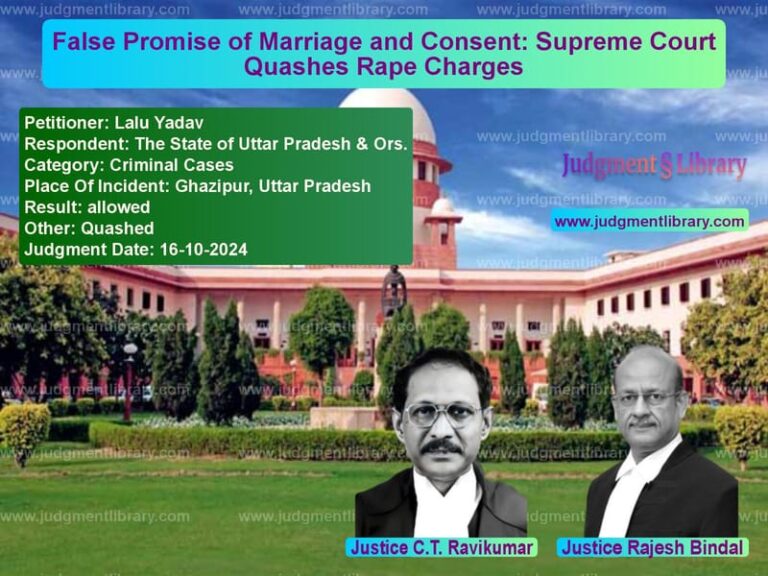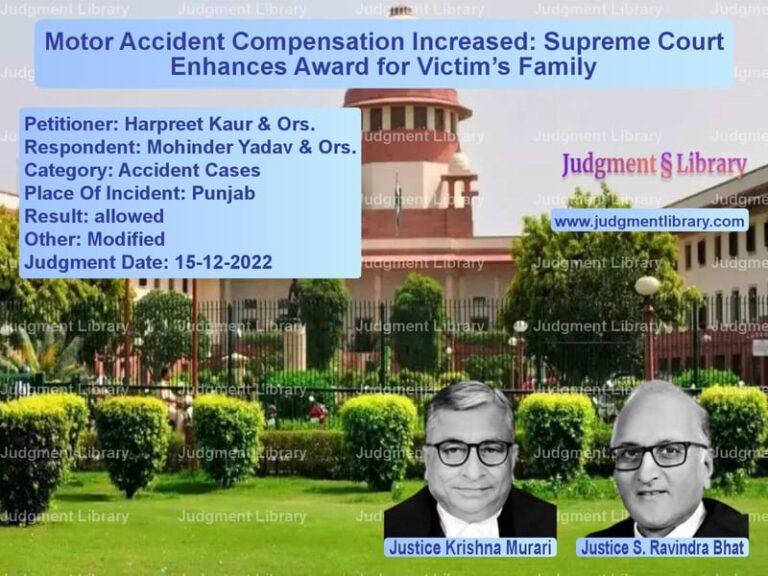Pension Rights of Work-Charged Employees: Supreme Court’s Verdict on Bihar Government Rules
In a significant ruling, the Supreme Court of India addressed the issue of pension eligibility for work-charged employees in Bihar. The judgment, delivered in multiple appeals, including those of Uday Pratap Thakur, Binod Kumar, Ganga Prasad Singh, and Maheshwar Pandey, scrutinized the provisions of Rule 5(v) of the Work Charged Establishment Revised Service Conditions (Repealing) Rules, 2013. The case raised an important legal question regarding the treatment of work-charged employees’ tenure for pension computation after their regularization.
The Supreme Court upheld the High Court’s decision that only a fraction of the period spent in a work-charged establishment would be considered for pension benefits. This judgment has far-reaching implications for thousands of work-charged employees seeking parity with regular government employees in terms of retirement benefits.
Background of the Case
Work-charged employees are typically hired for specific projects or assignments, often on temporary terms, without enjoying the same rights and benefits as regular government employees. Over time, various states, including Bihar, framed regulations to absorb work-charged employees into regular service. However, a contentious issue arose regarding whether their entire period of service under the work-charged establishment should be counted for pension computation.
The Bihar government, under the 2013 Rules, introduced a provision allowing a portion of work-charged service to be counted for pension eligibility. As per Rule 5(v), for every five years of service in the work-charged establishment, one year would be credited toward pension eligibility. The petitioners challenged this provision, arguing that their entire service should be considered.
Petitioners’ Arguments
The appellants, including Uday Pratap Thakur and others, presented the following arguments:
- They had served as work-charged employees for over three decades and had contributed significantly to government projects, just like regular employees.
- The government had extended other service benefits to them, including the Modified Assured Career Progression (MACP) scheme, which recognizes long-term service.
- They were recruited through a fair selection process via the Employment Exchange and not arbitrarily appointed.
- The judgment in Prem Singh v. State of Uttar Pradesh (2019) (10 SCC 516) had recognized that work-charged service should be counted for pension purposes.
- Excluding the majority of their tenure from pension calculation amounted to unfair discrimination.
Respondents’ Arguments
The Bihar government, represented by its counsel, opposed the claims, making the following points:
- Work-charged employees were never appointed through the formal recruitment process applicable to regular government employees.
- The distinction between regular and work-charged employees must be maintained; otherwise, it would undermine the fundamental differences in employment categories.
- The 2013 Rules were already beneficial, as they allowed a proportion of the work-charged tenure to be considered for pension eligibility, ensuring that long-serving employees would not be left without pension benefits.
- The case of Prem Singh was not applicable in this instance because it dealt with a different statutory framework under Uttar Pradesh rules, which had been struck down for being overly restrictive.
Key Observations of the Supreme Court
The Supreme Court, after reviewing the arguments and precedents, made the following crucial observations:
- “For the purposes of pension, only such period from the work-charged tenure would be added for making the service of an employee, which has been regularized, to qualify him for pension.”
- “While adding such period of work-charged tenure, the modus would be of granting/counting one year for every five years of service rendered under work-charged establishment.”
- “If that also leaves some shortfall, then further number of years of work-charged tenure can be taken/added for making the service of the employee pensionable.”
- “The rules governing pension benefits must ensure that work-charged employees who have been regularized are not left without pension eligibility.”
Implications of the Judgment
The Supreme Court’s ruling establishes a clear framework for calculating pension benefits for work-charged employees. While their entire tenure under work-charged employment will not be counted, the court recognized that ignoring their contributions entirely would be unjust. By allowing a portion of their work-charged service to count towards pension, the judgment strikes a balance between protecting government interests and ensuring fairness to long-serving employees.
This ruling is crucial for work-charged employees across India, as it sets a legal precedent that could influence similar cases in other states. The decision clarifies that while regularization does not automatically entitle employees to full pension benefits, reasonable provisions must be made to recognize their years of service.
Conclusion
The Supreme Court’s decision in this case reaffirms the principle that government employment rules must strike a balance between administrative feasibility and employee welfare. While it did not grant the appellants’ demand for full pension benefits, it upheld the legality of Bihar’s 2013 Rules, ensuring that work-charged employees who transition into regular service receive a fair consideration for their pension eligibility.
For thousands of work-charged employees who have spent decades in government service, this ruling provides clarity on their pension rights. The decision also underscores the importance of state governments implementing clear and fair policies for absorbing work-charged employees into permanent service while maintaining distinctions between different categories of employment.
Petitioner Name: Uday Pratap Thakur and Others.Respondent Name: The State of Bihar and Others.Judgment By: Justice M.R. Shah, Justice C.T. Ravikumar.Place Of Incident: Bihar.Judgment Date: 28-04-2023.
Don’t miss out on the full details! Download the complete judgment in PDF format below and gain valuable insights instantly!
Download Judgment: uday-pratap-thakur-a-vs-the-state-of-bihar-a-supreme-court-of-india-judgment-dated-28-04-2023.pdf
Directly Download Judgment: Directly download this Judgment
See all petitions in Pension and Gratuity
See all petitions in Public Sector Employees
See all petitions in Employment Disputes
See all petitions in Judgment by Mukeshkumar Rasikbhai Shah
See all petitions in Judgment by C.T. Ravikumar
See all petitions in dismissed
See all petitions in supreme court of India judgments April 2023
See all petitions in 2023 judgments
See all posts in Service Matters Category
See all allowed petitions in Service Matters Category
See all Dismissed petitions in Service Matters Category
See all partially allowed petitions in Service Matters Category







